***Singer Phil Everly -- half of legendary Everly Brothers -- dies
[Markin: I know I took a lotta, lotta grief in my junior days from the girls because I did not like the Everly Brothers. Much preferring classic Elvis (1956 and before), Jerry Lee Lewis, Chuck Berry and Bo Diddley]
updated 4:09 PM EST, Sat January 4, 2014
He was 74.
Patricia Aidem, a spokeswoman at Providence St. Joseph Medical Center in Burbank, confirmed Everly's death on Friday, but could not provide additional details, citing the family's request.
During the late 1950s and early 1960s, Phil Everly and his brother, Don (now 76), ranked among the elite in the music world by virtue of their pitch-perfect harmonies and emotive lyrics.
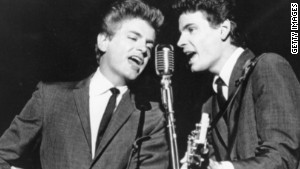
Singer Phil Everly dies at 74
Rolling Stone labeled the Everly Brothers "the most important vocal duo in rock," having influenced the Beatles, the Beach Boys, Simon & Garfunkel and many other acts.
Along the way, they notched 35 Top 100 songs -- more than any other vocal pair.
The Everly Brothers' sound -- with Don's lower register generally ringing in perfect thirds with Phil's higher voice -- was the backbone of dozens of hits.
The two began as songwriters before signing a deal in 1957 with Cadence Records. They became international sensations over the next five years with tunes such as "Bye Bye Love," "Wake Up Little Susie," "When Will I Be Loved" and "All I Have to Do Is Dream." In terms of record sales, their chief rivals during this stretch were Elvis Presley and Pat Boone.
Their style -- a product of their blend of rock 'n' roll with Appalachian folk, bluegrass and other genres more closely aligned to their Kentucky roots -- helped them earn inductions in both the Rock and Roll Hall of Fame and the Country Music Hall of Fame.
"The amount of music that can be directly traced to the Everly Brothers is incredible," wrote one admirer on Twitter. "Thanks, Phil...and 'Bye Bye.'"
Phil and Don were born in the business, the offspring of country and western singers Margaret and Ike Everly.
The Everlys sang with their parents in live shows and on the radio. In the mid-'50s, while still teenagers, they moved to Nashville to be songwriters. In 1957, they found a Felice and Boudleaux Bryant song, "Bye Bye Love."
According to "The Rolling Stone Encyclopedia of Rock & Roll," 30 acts had rejected the song, but the Everlys -- with the key guitar contributions of Chet Atkins, who played on many of their hits -- took the song to No. 2 on the pop charts.
"They added Bo Diddley riffs, teenage anxieties and sharkskin suits but -- for all that -- the core of their sound remained country brother harmony," read their bio on the Country Music Hall of Fame's website.
After averaging a Top 10 hit every four months over the next few years, the Everly Brothers inked a 10-year pact with Warner Brothers (which now is part of Time Warner, like CNN) in 1960. More success followed -- including "Cathy's Clown," which the duo wrote -- and they stayed particularly popular in Britain.
"Bye Bye Love" was "the first thing that really killed me," Paul Simon once recalled. He called Art Garfunkel immediately upon hearing the song, according to a Simon biography, and the two set to work on their own act.
The Everlys also served to bond the nascent Beatles.
Upon hearing "All I Have to Do Is Dream" in 1958, the young group -- which had just added George Harrison to a lineup that included John Lennon and Paul McCartney -- couldn't wait to cover it.
"When we first heard it, it blew us away," McCartney said in Mark Lewisohn's new Beatles biography, "Tune In."
By the 1970s, the pair was performing in a band that also included legends Warren Zevon and Waddy Wachtel. But their time together came to a sudden end in 1973, when Phil stormed off the stage during a show in California.
The brothers reunited on stage and in the studio 10 years later, leading to more albums, including "EB 84" (including the McCartney-written "On the Wings of a Nightingale") and "Born Yesterday."
Their remaining years were highlights by occasional shows, hall of fame inductions and various other honors, including a Grammy Lifetime Achievement Award in 1997.
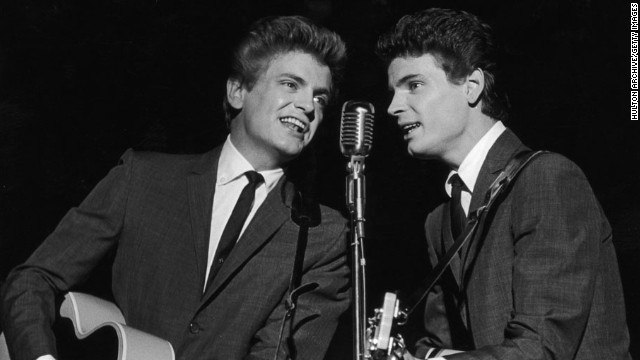 Singer
Singer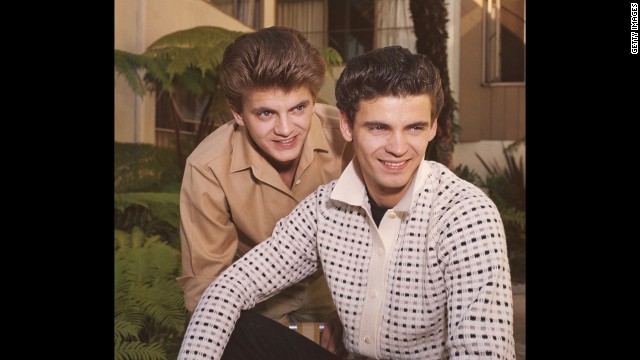 During the late 1950s and early 1960s, Phil Everly and his brother, Don, ranked among the elite in the music world by virtue of their pitch-perfect harmonies and emotive lyrics.
During the late 1950s and early 1960s, Phil Everly and his brother, Don, ranked among the elite in the music world by virtue of their pitch-perfect harmonies and emotive lyrics.
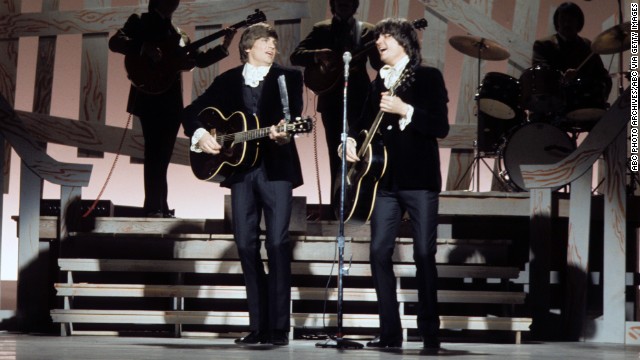 Rolling Stone labeled the Everly Brothers "the most important vocal duo in rock," having influenced the Beatles, the Beach Boys, Simon & Garfunkel and many other acts. Here, they perform on the Johnny Cash Show in 1970.
Rolling Stone labeled the Everly Brothers "the most important vocal duo in rock," having influenced the Beatles, the Beach Boys, Simon & Garfunkel and many other acts. Here, they perform on the Johnny Cash Show in 1970.
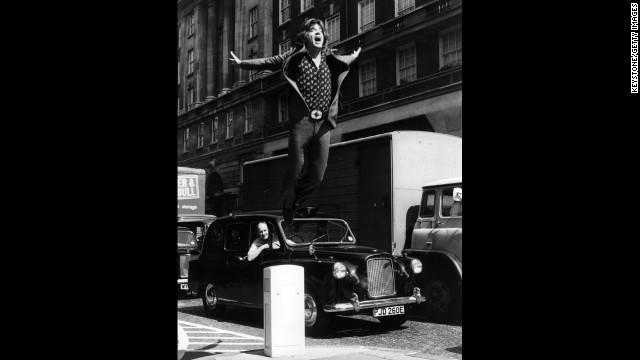 Phil Everly in London after signing a recording contract with Pye Records, having just recorded an album and a single, "Invisible Man," with his producer and close friend Terry Slater.
(CNN) -- Singer Phil Everly -- one half of the groundbreaking, smooth-sounding, record-setting duo, the Everly Brothers -- has died, a hospital spokeswoman said.
Phil Everly in London after signing a recording contract with Pye Records, having just recorded an album and a single, "Invisible Man," with his producer and close friend Terry Slater.
(CNN) -- Singer Phil Everly -- one half of the groundbreaking, smooth-sounding, record-setting duo, the Everly Brothers -- has died, a hospital spokeswoman said.
No comments:
Post a Comment